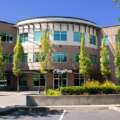In the past, aspiring entrepreneurs with interests in both engineering and business gained their expertise “in a silo,” says Chris Dito, Executive Director of the Management, Entrepreneurship, & Technology (M.E.T.) program at the University of California, Berkeley. They might typically earn an engineering degree, and then learn the business management and leadership side later, either on the job or by earning another degree.

UC Berkeley
That was old way. The new way is the streamlined M.E.T program: a dual degree from Berkeley’s College of Engineering and Haas School of Business, earned in four years, integrating the knowledge, experience and career development of the intersecting fields. Students gain “a comprehensive understanding of technology innovation, ready to start their own company, lead innovation inside an established firm or contribute to a social-impact venture.”
The first cohort of fifty students began in the fall of 2017. Current high school seniors admitted as freshmen in 2019 will be just the third cohort, but already can benefit from enhancements to the program. One is the new addition of Bioengineering and Civil Engineering to the current engineering choices of Electrical Engineering & Computer Science; Industrial Engineering & Operations Research; and Mechanical Engineering. “I think that is the best kept secret we have about the program,” says Dito.
To spread the news, Berkeley is heavily marketing M.E.T. right now to reach students from around the nation and around the globe. Assembling a diverse group of candidates is essential to developing a unique cohort and international students are very much encouraged to apply.
The M.E.T. program is rigorous. A typical course load is five or six classes and 20 units each semester, versus four classes and 16 units for a typical Cal Berkeley undergraduate. M.E.T. freshmen, for example, take math, natural science, computer science, business administration, and M.E.T. special topics their first semester; by senior year, they’ll be completing their required upper division engineering, business and computer science courses, as well as M.E.T. special topics and elective business courses. By the time they graduate, they will have earned 150 course units.
How can students manage this? The answer, says Dito, is a carefully curated academic experience, with a built-in support system of advisors to help students select their courses and manage their schedules. M.E.T. students also receive multiple advantages, such as priority access to classes, special programming, information sessions, and a speaker series, as well as being part of a tight-knit community of peers.
To help keep stress in check, there is an enhanced student services team dedicated to M.E.T. students, in addition to regular campus resources. They have access to complimentary wellness services, mindfulness resources, and their own collaboration space with TVs and snacks. “M.E.T. students are well-resourced and well-served,” says Dito.
Berkeley’s proximity to Silicon Valley and San Francisco enriches the M.E.T. experience. “We have companies on campus almost every day,” says Dito, either specifically for M.E.T. students or for the campus at large. Many companies are interested in hiring summer interns the fall before, so students are securing those internships right now. If M.E.T. students are interested in companies Berkeley is not already working with, staff will reach out to them on the students’ behalf.
Part of the M.E.T. curriculum includes helping students maximize their career potential. They receive ongoing career development to increase their self awareness and boost their professional confidence; and participate in industry meet-ups and presentations to gain occupational awareness. “When they know both themselves and the world of work better, they can make better career-based decisions,” says Dito.
If it sounds as if this program was created just for you, consider a campus visit and tour. It won’t give you an admission advantage, but it can help you gain more clarity about your fit for the program. M.E.T. staff are available by appointment and every Friday afternoon to speak with prospective students.
To apply, you’ll select the engineering major, and choose the M.E.T. track. The University of California application is open August 1 to November 30, so you can start on the supplemental essay now; submission runs from November 1 to November 30. Potential candidates will be offered a 20-minute SKYPE interview with faculty by the end of January. Students who are not selected for the M.E.T. program will be automatically considered for admission to the College of Engineering; if they are admitted for the regular engineering program, they will be automatically added to the M.E.T. wait list.



